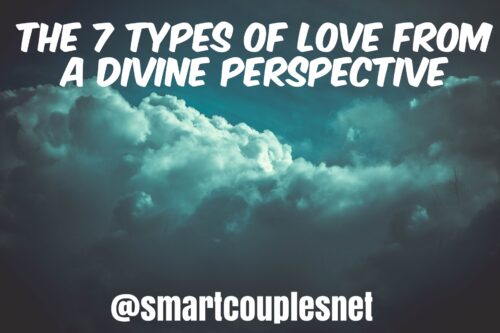The 7 Types Of Love From A Divine Perspective
 In our last study, we talked about Agape love as being the king of love. In this study, we shall talk about the 7 types of love from a divine perspective in order to give you some insights as to their origins and descriptions, and also help you manifest these love to better your relationship.
In our last study, we talked about Agape love as being the king of love. In this study, we shall talk about the 7 types of love from a divine perspective in order to give you some insights as to their origins and descriptions, and also help you manifest these love to better your relationship.
Let’s begin by saying that Love never started with the Greeks nor with humans. Love started with God. In the beginning, was God and God created all things. God is love in Himself (1 John 8:4; Genesis 1:1).
The ancient Greeks were gifted, no doubt, and they studied love and classified them into different types. But whatever they studied was in the light of what was known or made known to them. Most of which were myths.
What’s a myth? Greek Myth or let’s say, mythology is the body of myths originally told by the ancient Greeks. These stories concern the origin and the nature of the world, the lives and activities of deities, heroes, and mythological creatures. It must be said that all these are ancient and classical Myths were trying to understand the creation and works of God in the beginning. They did not have the volume of truth and knowledge that we have today and as revealed by God in the Bible.
Therefore, the fact that we mentioned them here does not necessarily make them the truth. You can read this title here for a better understanding. The truth still remains that God created all things and when you follow God, you can understand the created things or the works of God. But you cannot follow the created things or the works of God to understand God. Something Mythology tried to do. That being said, let’s go straight to The 7 Types Of Love From A Divine Perspective, and the first type is:
1. “Agape” Love
 The word “Agape” is the Greek word for love. This love is unlike the natural love between siblings, husbands and wives, and between friends. This is divine love, the God-kind of love, which finds origin from God and ends with God. Through this love, we can love God and appreciate the works of God. Through it, we can love our fellow brethren as ourselves. And through it, we can be partakers of God’s works.
The word “Agape” is the Greek word for love. This love is unlike the natural love between siblings, husbands and wives, and between friends. This is divine love, the God-kind of love, which finds origin from God and ends with God. Through this love, we can love God and appreciate the works of God. Through it, we can love our fellow brethren as ourselves. And through it, we can be partakers of God’s works.
God created man in a perfect state. For, according to the Bible, He saw that all He had made was good, very good indeed (Genesis 1:31). In creating man, He imparted the God-kind of love in man, which enabled man to love God. Man, in love, had constant fellowship with God in the cool of the day (Genesis 3:8).
Man also loved his environment, he worked and cared for it. He loved and named other animate creatures (Genesis 2:19, 23). He also loved his wife as himself. Because of the love of God in man, they felt no shame in their nakedness, and had no fear in them, for perfect love drives out all fear (I John 4:18).
Only when man sinned that they fell short of this Agape (divine) love. They could love God no longer; in fact, they ran away from the usual presence of the Lord when the Lord approached them (Genesis. 3:8-10).
The love between the man and his wife was also marred. The man could no longer love his wife with his first love. Indeed, he blamed her for his fall. He would have preferred all the consequences of his fall to be upon the woman alone (Genesis. 3:12).
He also could not love his environment anymore. No comfort was found where he used to fellowship with the divine being. Leaving his environment to hide was far better than seeing the face of the Almighty God. All of these were so because of the God-kind of love, that Agape in man was marred.
 But praise God, that this Agape love in man is rejuvenated by the Holy Spirit, as we accept Jesus Christ as Lord and Savior of our lives (Roman 5:5). We can now love our brothers and sisters as we love ourselves. We can now love God and be partakers of God’s works. We can partake in nation-building, making the world a better place just as God wants us, humans, to do on earth.
But praise God, that this Agape love in man is rejuvenated by the Holy Spirit, as we accept Jesus Christ as Lord and Savior of our lives (Roman 5:5). We can now love our brothers and sisters as we love ourselves. We can now love God and be partakers of God’s works. We can partake in nation-building, making the world a better place just as God wants us, humans, to do on earth.
Furthermore, we can now love ourselves right and love our spouses right as God wants us to love them. All of which could not be possible without the Agape likeness of God in man.
2. “Eros” Love
 In Greek mythology, Eros, which means “Desire” is the Greek god of love. His Roman counterpart was Cupid. A word which, as well, means “Desire.” He was also called “Amor” in Latin, which is literally translated as “Love”. Cupid is the god of desire, erotic love, attraction, and affection. These meanings are exported to the word, Eros.
In Greek mythology, Eros, which means “Desire” is the Greek god of love. His Roman counterpart was Cupid. A word which, as well, means “Desire.” He was also called “Amor” in Latin, which is literally translated as “Love”. Cupid is the god of desire, erotic love, attraction, and affection. These meanings are exported to the word, Eros.
But Eros centers on the lust of the flesh, particularly sexual lust. Lust is a psychological force producing intense sexual wanting or longing for a person, or circumstance fulfilling the emotion. Lust is a purely sexual concept. This is the type most akin to our modern construct of romantic love.
Eros is described as one of the children of Aphrodite, the ancient Greek goddess associated with love, beauty, pleasure, passion, and procreation. It’s important to note that God created man with the erotic dimension. Man was attracted to his wife and legally had sexual intimacy with his wife, Eve. This has been so since creation. Through the erotic dimension, procreation was and is possible. Thus, fulfilling the law and command of God to multiply and fill the earth (Genesis 1:27-28; 2:24-25).
3. “Philia” Love
 Philia is the Greek word for “Brotherly love.” this kind of love is affectionate with a strong sense of bonding between people, but it’s never sexual. It’s the friendship kind of love that sees the usefulness and good in others and values them as equals. It can bring people together as one in times of trials and difficulties. It’s the root of companionship, dependability, and trust.
Philia is the Greek word for “Brotherly love.” this kind of love is affectionate with a strong sense of bonding between people, but it’s never sexual. It’s the friendship kind of love that sees the usefulness and good in others and values them as equals. It can bring people together as one in times of trials and difficulties. It’s the root of companionship, dependability, and trust.
Plato, the Greek philosopher, made reference to this as the love that’s not based on attraction or sexuality. Hence, the use of the word “Platonic” when talking about a Philia kind of relationship in today’s world. Its exact opposite is “Phobia,” the fear of people or things. While Philia brings people together as equals, Phobia keeps them far apart from each other.
God created man with the Philia-dimension which helped them live as families and in communities without sexual attraction involved.
4. “Storge” or Storgic Love
 Storge (pronounced as “store-gae”), is a Greek word for familial love. A kind of Philia which refers to natural or instinctual affection, such as the love of a parent towards offspring and children toward their parents.
Storge (pronounced as “store-gae”), is a Greek word for familial love. A kind of Philia which refers to natural or instinctual affection, such as the love of a parent towards offspring and children toward their parents.
Storge is the fondness born out of familiarity or dependency and, unlike Eros or Philia, does not hang on our personal qualities. But it also can overlap with the other types of love such as Eros. People in the early stages of a romantic relationship often expect unconditional Storge.
God created man with the Storge dimension through which the first family was raised. But when man sinned, the dimension came short of what God intended it to be. Cain who has lived as a brother could still kill Abel at a point in time. This goes to tell us how short Storge had become when man fell from glory. You can read more on that here.
5. “Ludus” Love
 Ludus is actually not an independent type of love. It doesn’t stand in a class of its own. But it’s an aspect of Eros.
Ludus is actually not an independent type of love. It doesn’t stand in a class of its own. But it’s an aspect of Eros.
To start with, “Ludus” (plural, Ludi) is not a Greek word but a Latin word imported from the ancient Roman culture. Ludus has several meanings within the semantic field of “play, game, sport, training.” This word is imported into the field of love to denote its playful nature. Ludus love is flirtatious and playful, whether committed or uncommitted. It’s more of Erotic love and belongs there. It really doesn’t and cannot stand alone as an independent kind of love.
With Ludus, you can flirt and be playful with your lover or even with someone else who isn’t your lover, and you can fall for that person and even be intimate without any commitment to a lasting relationship. With teasing and dancing, overt flirting, seducing, and conjugating, Ludus can be promiscuous and immoral in manifestation. People usually say that they mistake Ludus for Eros, but they are wrong because Ludus belongs to Eros, period. Trying to distinguish it from Eros only exposes its immoral nature.
It’s dangerous to advocate that you can be erotically playful and flirtatious with someone but don’t go deep to having an intimate relationship. Why playful? Why flirtatious with someone who isn’t your lover? In any case, this is the manifestation of Eros on a side not desired by many lovers. If you wanna flirt, do so with your lover. If you wanna be playful, do so with your lover or spouse. If you trespass that border, it becomes infidelity to the love of your life. Your spouse deserves all of your attention.
6. “Pragma” Love
 The word “Pragma” has its root in ancient Greece meaning “a thing done or fact. It could also mean Pragmatic or pragmatism. Pragma is a kind of practical love based on reason or duty and on one’s longer-term interests. The sexual attraction takes a back seat in favor of personal qualities and compatibilities, shared goals, and making things work.
The word “Pragma” has its root in ancient Greece meaning “a thing done or fact. It could also mean Pragmatic or pragmatism. Pragma is a kind of practical love based on reason or duty and on one’s longer-term interests. The sexual attraction takes a back seat in favor of personal qualities and compatibilities, shared goals, and making things work.
Pragma is the kind of love that has endured the test of time, made several compromises, been tolerant and patient for each other. Those in Pragma are very matured in love. They are not moved by the common errors in life that divide partners. Arranged marriages use pragma to bring and keep partners together. In the biblical days also Pragma was widely used in marriages and they lasted longer than some of what we have today.
7. “Philautia” Love
 Philautia is self-love. The Bible asks us to love others as we love ourselves. We are expected to love ourselves in a healthy way because this kind of love can be healthy or unhealthy. Unhealthy self-love is akin to hubris which has a sense of inflated self-status, or accomplishments, backed by a high level of haughtiness or arrogance. As it disregards the truth, hubris can promote injustice, conflict, enmity, and many other evils.
Philautia is self-love. The Bible asks us to love others as we love ourselves. We are expected to love ourselves in a healthy way because this kind of love can be healthy or unhealthy. Unhealthy self-love is akin to hubris which has a sense of inflated self-status, or accomplishments, backed by a high level of haughtiness or arrogance. As it disregards the truth, hubris can promote injustice, conflict, enmity, and many other evils.
Healthy self-love is self-esteem, which is the positive or negative evaluations of the self, as in how we feel about it. It’s our cognitive and emotional appraisal of our own worth relative to that of others. And also, the matrix through which we think, feel, and act.
Self-esteem should embody self-confidence naturally. But this is not usually the case. Because self-confidence and Self-esteem do not always go hand in hand. You can be highly self-confident and yet have profoundly low self-esteem, as with the cases of many rich personalities and celebrities.
People with high self-esteem do not need to prop themselves up with externals such as income, status, or notoriety, or lean on crutches such as alcohol, drugs, or sex. They are able to invest themselves completely in projects and people because they do not fear failure or rejection. Of course, they suffer hurt and disappointment, but their setbacks neither damage nor diminish their self-esteem.
Owing to their resilience, they are open to growth experiences and relationships, tolerant of risk, quick to joy and delight, and accepting and forgiving of themselves and others. As we have seen above, God didn’t just ask us to love each other as we love ourselves, but He actually created man with the Philausia dimension which initially aided man to love himself and had no shame when he and his wife were naked.
But when he sinned, he began to know fear, lack of self-worth, lack of self-confidence even to the point of not being able to stand before the God he used to stand at first. Because of sin, man first became ashamed of himself before his colleagues and God.
In conclusion, there is a level of porosity in The 7 Types Of Love From A Divine Perspective, which we have described above. In describing them, we have used the points of view from ancient Greek culture whose knowledge was a blessing yet limited to what we now know today, especially as revealed by the creator, God, Himself.
The real truth is found only in God. All the other types of love are encapsulated in the Agape type of love. With Agape in you, you can manifest all the other types of love. But all the other types of love cannot manifest Agape, because Agape encompasses all the other types of love. You can read more of that here.



Thank you for clarifying the different kinds of love.
Love is the basis of happiness, without it you are lost, and we sometimes do not have the respect it needs.
When do you think does a human feel and recognize the emotion of love for the first time?
It was a great article.
Stella
Bush Lady
Thank you for the comment, Lee. Your input too was welcome. have a great day.
Pentrental, yes, you got. It was great hearing from you. Thanks for passing by and for commenting. Have a grea day.
Thanks for the comment Mahin. I am glad you loved it and learned something from it too. Enjoy your weekend.
Hello.
It’s incredible how you know your classics. The Ancient Greek and Roman civilization were indeed very advanced in a lot of aspects. The Greek Myths are well known and for those who do not know them, words like Eros or Aphrodite they understand.
In my opinion, you described very well the different types of love, and I’m astonished to see how from the Ancient Greek knowledge you could explain the different types of love. Those different types of love are still actual. Starting with the divine love Agape, love has within relation to God, a lot of different aspect on earth.
Ending with Philautia or self-love, you end also with the beginning as a love relationship whatever it is can never grow qualitatively if there is no self-esteem, self-confidence
Hey Carlo,
This is an unique and informative article I must say. I appreciate that you have chosen such a topic to write. I liked the point that Love never started with the Greeks nor humans it started with God. Which makes this thing more divine. I had no ideas on Agape love but after reading your article I have come to know many things about it. Moroever i learned a lot of stuffs about the seven form of love. I will be looking forward to get more articles like this from you.
Thank you for sharing so much informations.
Great post I found the different types of love and their historical significance in this post quite interesting. So we have divine love in Agape, sexual love in Eros, brotherly love in Philia, familial love in Storge, an aspect of Eros in Ludos, practical love in Pragma, and self-love in Philautia, got it I think! I really hadn’t considered breaking love down into so many subsets and I really like how they are put into place here through Greek mythology. I enjoyed your post and I’m looking forward to reading more, well done!
A very inspirational post. It certainly makes for self-reflection and can help someone make an inventory of what is important. For human beings, it is interesting that agape love doesn’t come naturally but there seems to be an inner desire to obtain and share it. John describes God as being love and in both cases, there seems to be a desire to know but without revelation, people are lost to both.
Well written article about 7 types of love from a divine perspective that has been described in Greek mythology. From these categories, we got to know about Greek mythology and culture in ancient times. It’s really amazing how it was analyzed and written of different types of love. I do have a fascination to know more about the Greek culture in ancient times. Thanks for the article.